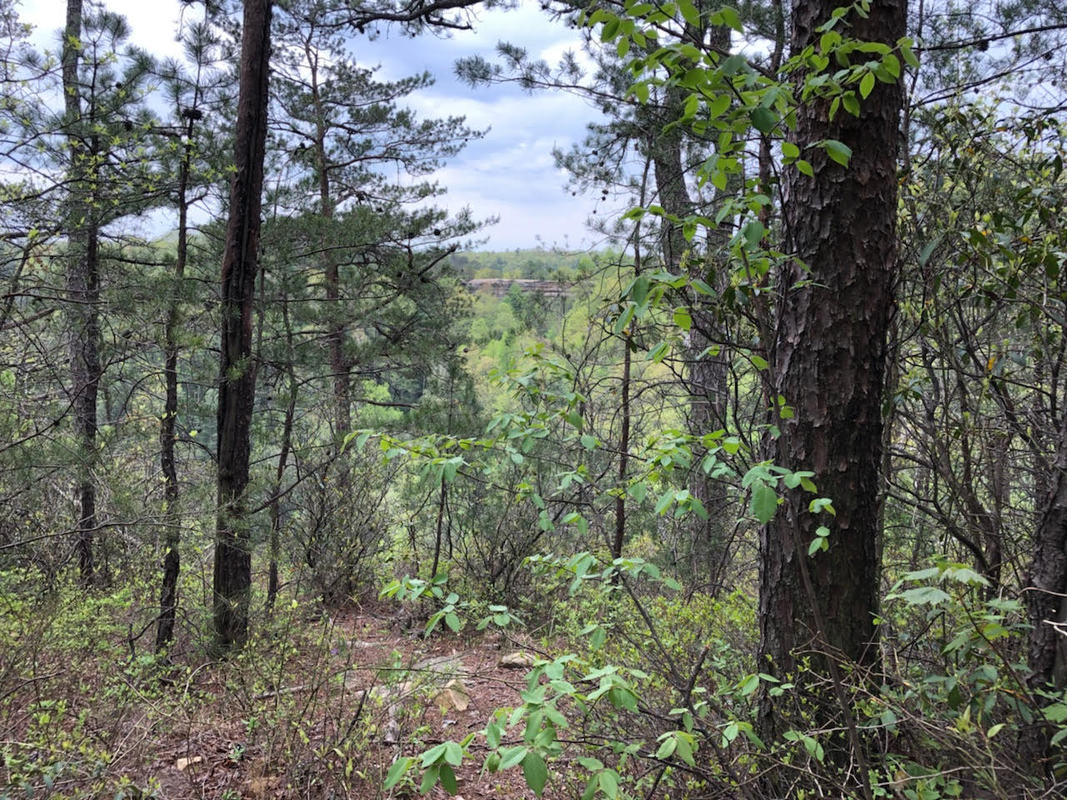 Along a trail at Kentucky’s Natural Bridge State Park. The bridge is visible in the background. Along a trail at Kentucky’s Natural Bridge State Park. The bridge is visible in the background. It has been a spring riddled with grief. Two cousins, a close colleague, my husband’s uncle, a good friend’s mother, a neighbor I didn’t know well but who died so unexpectedly it sent us all reeling. That made getting out in the woods one day last week before the weekend deluge even more healing and restorative than usual. Hiking in Kentucky’s beautiful hardwood forests has always been high on my list of outdoor pleasures. I have to believe that some of my affinity for that activity was handed down to me from my dad—whether through genetics, through family picnics and camping trips, or through the endless hours of slides relating to his research he sometimes subjected us to. In the 1960s, most families viewed slides of birthday parties or other family gatherings. We sat quietly as he shared images of rock formations and treefall sites. In those days, children rarely had the chance to choose the family’s entertainment. Recent research has provided some evidence of a real connection between spending time in natural environments and reducing stress, anxiety, and depression. The Green Road Project at the Walter Reed National Military Medical Center in Bethesda, Md., is currently attempting to measure these changes mathematically using biological markers such as levels of cortisol in the blood rather than the self-reported mood surveys commonly used in other research. Researchers involved in the project are particularly interested in understanding if time spent in a natural environment will promote healing among veterans suffering from PTSD or traumatic brain injuries. A more far-reaching goal of projects such as these is to offer community decision-makers objective evidence for championing local green spaces that improve health and well-being. In 2016, the World Health Organization (WHO) produced a comprehensive report titled “Urban green spaces and health.” The report particularly focuses on how easily-accessible green spaces provide a respite from stress, a venue for physical activity, and an environment shielded from a city’s air and noise pollutants. The report concludes in part that “The evidence shows that urban green space has health benefits, particularly for economically deprived communities, children, pregnant women and senior citizens. It is therefore essential that all populations have adequate access to green space, with particular priority placed on provision for disadvantaged communities. While details of urban green space design and management have to be sensitive to local geographical and cultural conditions, the need for green space and its value for health and well‐being is universal.” My personal anecdotal evidence fully corroborates any conclusions correlating time spent in the woods and better emotional and physical health. Walking along a woodland trail, removed from the stressors and pressures of daily life, immediately calms you. The serene environment soothes you. The beauty awes you. Sometimes the experience even reminds you of our interconnectedness with nature and how we rely fully on the natural areas of this world for each and every breath. Which is why the disclaimer on the WHO report was more than mildly disturbing. I could just imagine the machinations behind the scenes before this report was published. Disclaimer: The views expressed in this report are those of the authors and do not necessarily reflect the views or policies of the U.S. Environmental Protection Agency. I would like to think that our country’s questionably named Environmental Protection Agency (EPA) still cares about protecting our natural environments. But we have all come to understand that that is a naïve assessment of the agency’s role. So it’s up to us to protect these precious areas. I hope you will consider the small things you can do to help preserve the natural woodlands that support human life. And when you need relief from the vagaries of a sometimes cruel existence, I hope you, too, will wander a nearby woods and reclaim a sense of peace.
0 Comments
Your comment will be posted after it is approved.
Leave a Reply. |
Details
Archives
June 2023
Categories
All
|


 RSS Feed
RSS Feed